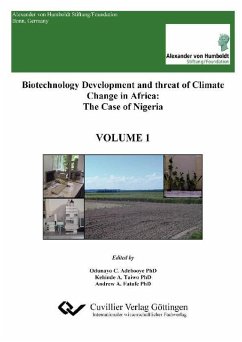Basically, the contemporary manipulation of identifiable living cells and bacteria in industrial and
scientific processes has been functionally essentialized by the desire to improve on the state of the
human condition in this modernizing era. Meanwhile, the prevalent globalizing culture has made it
feasible for quick exchange of information and, indeed, instant spread of cogent empirical knowledge.
Such is the case with biotechnological development, which seeks to enhance agricultural productivity;
health care delivery and, of course, the realization of the focal target of the ‘Millennium Development
Goals’ (MDGs), that is ‘halving extreme poverty by 2015’. As noble as this innovation seems
however, its application in Nigeria as obtainable in most parts of sub-Saharan Africa has been largely
uncoordinated, or at best, attenuated; ostensibly due to inactivity on the part of the political leadership.
This study focuses on the explication of varying interpretations of the reality of biotechnological
incorporation within Nigerian configuration. On the part of the policy planners, have usual
proclamations been met with desired actions in the bid to localize such innovation in the country? Are
they conscious of its long-run human, social and environmental implications? On the other hand, are
the people – the supposed direct beneficiaries of such adaptation aware of its existence and
usefulness? How do they perceive and construct its reality? These and related issues are addressed in
this study. The methods of In-depth Interviews (IDIs) and Evaluation Research (ER) are engaged as
the study’s modes of inquiry, while Berger and Luckmann’s ‘The Social Construction of Reality’ is
adopted as its theoretical platform.
Dieser Download kann aus rechtlichen Gründen nur mit Rechnungsadresse in A, B, BG, CY, CZ, D, DK, EW, E, FIN, F, GR, HR, H, IRL, I, LT, L, LR, M, NL, PL, P, R, S, SLO, SK ausgeliefert werden.


